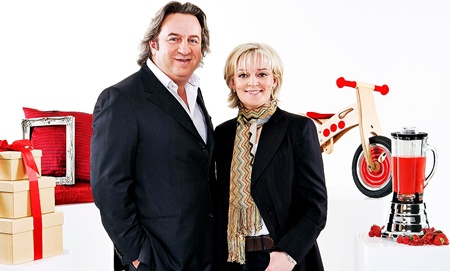Friday before last saw the 4th and last programme in the mini series High Street Dreams on BBC1; The ‘reality TV show’ about product branding, packaging & design development. Over the series Jo Malone and Nick Leslau have helped a number of individuals to launch new products.
It’s been a long 6 weeks since the 3rd programme, during which the ‘void’ has been filled with all sorts of interruptions such as Wimbledon and World Cup football – how inconsiderate!
From a packaging design perspective, I don’t think that the 3rd show was as good & fulfilling as the first two, but still entertaining and was to some extent rectified in the 4th show. Whilst the advice & support given to budding entrepreneurs on High Street Dreams provides a ‘snapshot’ of what’s required in the packaging development process (usually from the ‘sexy’ brand perspective), having watched all of the programmes, I can’t help thinking that packaging has been viewed at a very superficial level. Many of the requirements necessary to get a product to market, seem to have been simply glossed-over or even ignored completely. I appreciate that many of the more technical issues that were possibly raised during development discussions were not actually shown in the final ‘cut’, but I’m sure that most of it was simply not addressed. Branding is only part of the picture. At the end of the day packaging performs a number of other varied and important roles; containing, protecting. preserving, transporting, informing & selling and has to meet a number of important stakeholder needs at all stages of the supply chain, from manufacturing & filling, through warehousing & transportation, retail and consumer-use to final disposal or reuse.
For each of the product areas covered in the programmes, a unique set of circumstances needs to be considered, depending on the product itself, the route to market (whole supply chain) and consumer needs involved. Clearly, the packaging needs for a unique Beryl Brewis woolen scarf will be different to that of a spicy Mr Singh’s Chilli Sauce or a packet of Muddy Boots premium food products.
To start with, purchasing clothes products is a much more ‘tactile shopping experience’ than for foods and whilst some up-market strategically placed packaging can enhance perceived ‘value’, the printed text is mainly aimed at reinforcing the brand credentials and providing product and bar code information for identification and tracking logistics movements and sales. With food products there is a far greater consideration graphically (text) for shelf-life (use before), food legislation, warnings and claims. But also structurally, a need to choose components that will meet the brand credentials, market segment needs and user aspirations as well as protecting and containing the product within from spoilage.
So over the next 4 days, I’ll take a look at the 4 products covered in last two shows and as well a giving an overview of what happened in the two shows and how packaging and design aspects were tackled, I’ll also take a ‘step-back’ and provide my thoughts on some of the other important issues that those entrepreneurs need to consider (or should have considered already) in the successful launch of their products to a mass market!
So keep your eyes open for the following postings on this site:
Tuesday 20th July: ‘Fashion accessories’ striving to be the next fashion brand. Beryl Brewis, a single mum from Buckinghamshire producing high quality chunky hand-knitted scarves.
Wednesday 21st July: ‘Fashion accessories’ striving to be the next fashion brand. Claire English from Lewes, East Sussex, making distinctive and eclectic homemade jewellery.
Thursday 22nd July: ‘Homeware’ – Harry Singer from Somerset with his innovative wall hanging picture ‘Monkey frames’ ( Phlib) product.
Friday 23rd July: ‘Homeware’ – Bex Simon an artistic blacksmith from East London who designs beautiful one-off metal-ware objects for the home.
Chris Penfold

cecil says:
oliver says: